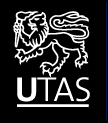Jeff Ross, IMAS
12:00-12:50pm Wednesday Nov 9th
Seminar room, IMAS Sandy Bay
Abstract:
Nutrients inputs are one of the most significant risks to coastal waters around the world including waters around the Australian coast. The nutrient of key concern for most marine waters is nitrogen because excessive nitrogen can lead to coastal eutrophication, with a loss of biodiversity in benthic habitats, and consequent threats to fisheries. The risk of eutrophication depends most obviously on the level of nutrient input, but also, critically, on the processes that remove nitrogen from the water. Although removal of nitrogen can occur via transport of nutrient-rich water offshore, in many water bodies the key ecosystem process is denitrification, which effectively transfers nitrogen from the water to the atmosphere. Any change to denitrification efficiency, particularly one resulting in a lower threshold for eutrophication, has important implications for how we manage nutrient inputs.
In this talk I will present results that demonstrate the consequences of a marine pest invasion, reduced environmental flows and a secondary treatment upgrade for key nitrogen cycling processes, and ultimately, the management of nutrients. For environmental management, this work highlights the importance of considering interactive effects of multiple anthropogenic pressures.
Biography:
Jeff has over 15 years of research experience studying human impacts on the structure and function of coastal and estuarine ecosystems. He moved to Tasmania in 1996 to undertake his PhD at UTAS/CSIRO following his undergraduate training in Melbourne. He returned to Melbourne for a postdoctoral fellowship investigating the effects of marine pests on nutrient cycling in Port Phillip Bay. In 2005 he crossed Bass Strait once again to take up a postdoctoral fellowship under the joint UTAS-CSIRO Quantitative Marine Science Program. Now settled with a young family in Tasmania, he is a Research Fellow in the Estuaries and Coasts Program in IMAS. His present research incorporates ecology, biogeochemistry and ecosystem modelling, with a focus on improving our understanding of the key drivers of ecosystem dynamics in the face of environmental change in the coastal zone.


